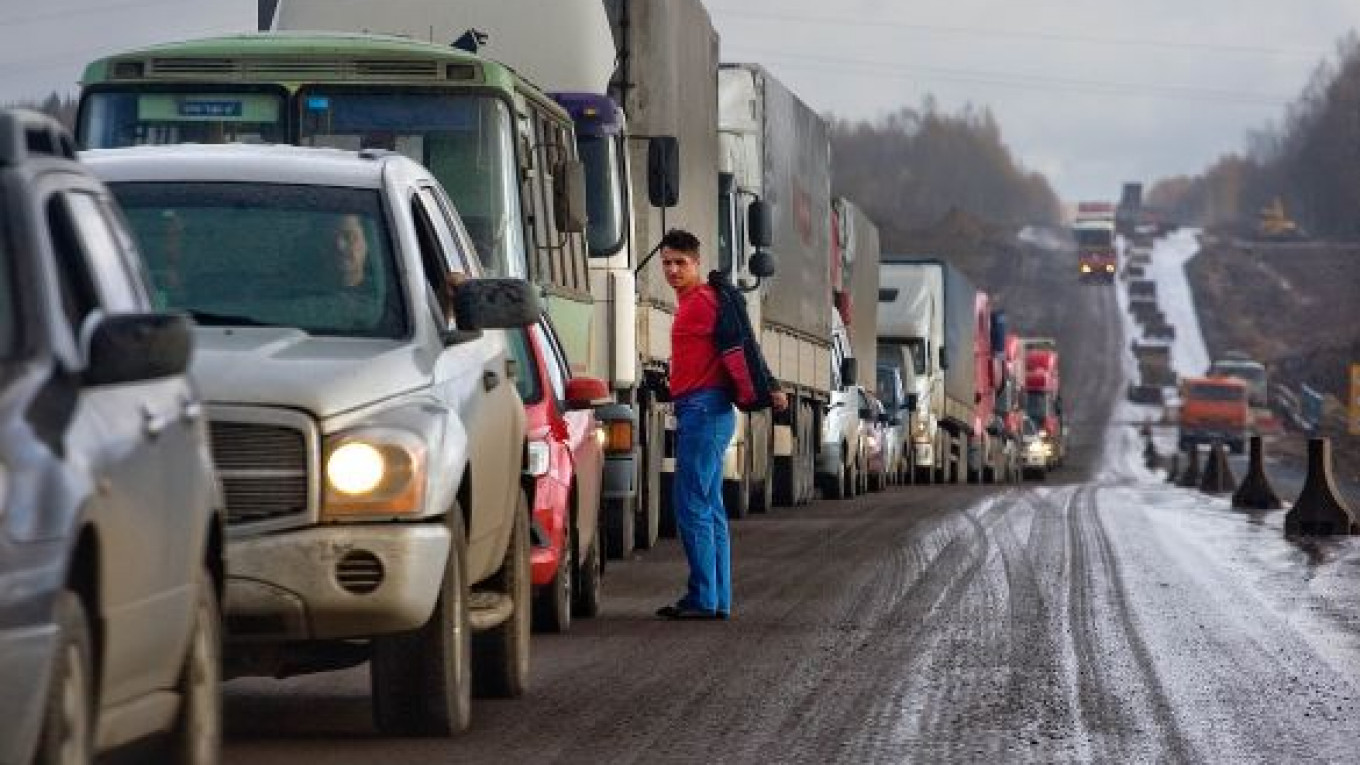An unprecedented 1.8 trillion rubles ($54 billion) will be invested in road and rail infrastructure in the Moscow region over the next five years, Konstantin Lyashkevich, the head of the regional road management agency, said Thursday.
The money is to come from various sources: municipal, regional and federal government budgets, as well as from private investors.
"It will be spent on road and rail network improvement, on new metro lines, airports, interchanges, parking spaces for large trucks, that is, for all infrastructure that needs an upgrade," Lyashkevich said.
The biggest and most expensive infrastructure project in the region is the Central Ring Road, a toll highway that will be built to complement the Moscow Ring Road.
The construction of the Central Ring Road will cost on average 1 billion rubles per kilometer. Its main sections are expected to be completed by 2018. The road is a priority for the government as the highway is planned to serve as a bypass for heavy traffic going around Moscow.
The project has been criticized for being too expensive. Also, questions remain on whether land will be expropriated at a fair price and how much damage such a major highway will do to the environment.
"The road will go around large settlements to minimize the impact it will have on ecology," Lyashkevich said. "As for the cost, considering that it will be a six-lane highway, the figures correlate with what was spent to build the ring road around London, which has approximately the same length."
Meanwhile, state-owned company Avtodor, which manages toll road construction in the country, has begun to prepare territory for investors who will come to build the road. How much land will have to be expropriated and its value are yet to be determined, Lyashkevich said.
The road will be built by a private investor under a concession agreement after the state company completes all the necessary land allocation procedures. Part of the territory intended for the eastern segment of the ring is expected to be ready for construction works starting from next year.
Top state banks, such as Sberbank, VTB, Vneshekonombank and Gazprombank, have already submitted their documents to participate in the upcoming tender, Lyashkevich said. Also, a large Australian infrastructure fund and other international companies are interested in the project, he added.
The federal and regional authorities also plan to improve railroad infrastructure. Five new separate railways will be built to complement the existing lines where passenger and freight traffic are heaviest.
They will require modern multi-level rail and road intersections. Most existing rail intersections have obsolete crossing gates that prevent cars from going across the railroad when trains approach. Such crossings can hold up auto traffic for more than three hours during rush hours.
An older regional program, costing almost 70 billion rubles, implied that the 16 worst crossing gates would be upgraded to multi-level crossings by 2018. Now, as new railroads are planned to be built, the number of such intersections has increased to 40.
Contact the author at a.panin@imedia.ru
A Message from The Moscow Times:
Dear readers,
We are facing unprecedented challenges. Russia's Prosecutor General's Office has designated The Moscow Times as an "undesirable" organization, criminalizing our work and putting our staff at risk of prosecution. This follows our earlier unjust labeling as a "foreign agent."
These actions are direct attempts to silence independent journalism in Russia. The authorities claim our work "discredits the decisions of the Russian leadership." We see things differently: we strive to provide accurate, unbiased reporting on Russia.
We, the journalists of The Moscow Times, refuse to be silenced. But to continue our work, we need your help.
Your support, no matter how small, makes a world of difference. If you can, please support us monthly starting from just $2. It's quick to set up, and every contribution makes a significant impact.
By supporting The Moscow Times, you're defending open, independent journalism in the face of repression. Thank you for standing with us.
Remind me later.






